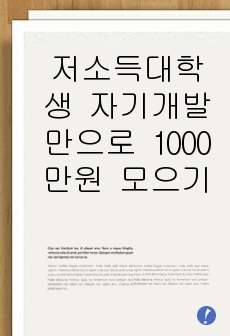學業成就와 知覺된 養育態度가 自我槪念에 미치는 影響
* 본 문서는 배포용으로 복사 및 편집이 불가합니다.
서지정보
ㆍ발행기관 : 한국교육학회
ㆍ수록지정보 : 교육학연구 / 23권 / 2호
ㆍ저자명 : 金琪正
ㆍ저자명 : 金琪正
목차
Ⅰ. 緖論Ⅱ. 硏究方法
Ⅲ. 硏究의 結果
Ⅳ. 論議
Ⅴ. 結論
參考文獻
[Abstract]
영어 초록
OBJECTIVESThe purpose of the study was to investigate the determinants of self-concepts of elementary and secondary school students. To achieve this purpose, the following specific objectives were set forth.
a. The cumulative effect of successive academic success and failure on academic and non-academic self-concepts.
b. The impacts of the academic achievements and the perceived parental attitudes on the self-concepts of students.
c. The combined and the relative effects of selected variables (students' IQ, home social status, academic achievements, the perceived parental attitudes, and classroom social status) on academic and non-academic self-concepts.
In order to study these objectives, the following 8 hypotheses were set forth :
Hypothesis 1: As the students grow older, their self-concepts will show negative tendency.
Hypothesis 2 : Academic achievements will show a higher correlation coefficient with academic self-concept than with non-academic self-concept.
Hypothesis 3: There will be a higher positive correlation coefficient between academic achievements and academic self-concept, irrespective of home social status and students' IQ.
Hypothesis 4: The successive academic success and failure will show the cumulative effects on both academic and non-academic self-concepts.
Hypothesis 5 : The perceived parental attitudes will show a higher correlation coefficient with non-academic self-concept than with academic self-concept.
Hypothesis 6 : There will be a positive and significant correlation coefficient between the perceived parental attitudes and the self-concepts (both academic and non-academic), irrespective of home social status, students' IQ, and academic achievements.
Hypothesis 7: The two groups of students chosen and rejected on sociometric groupings will show different self-concept scores.
Hypothesis 8 : The selected variables (student' IQ, home social status, academic achievements, the perceived parental attitudes, and classroom social status) will show different effects on academic and non-academic self-concepts.
SAMPLES
The samples for the study were composed of two parts.
<Sample 1.>
This part of the samples was formed to test the cumulative effects of successive academic success and failure on the self-concepts (hypothesis 4). The subjects were selected in each grade from grade four through nine. The criteria of the selection were the level of school achievements which had belonged to top 23% all over past school years beginning from grade two for 'success' group, and to bottom 23% for 'failure' group.
<Sample 2.>
This part was formed to test all the hypotheses except that of No.4. The subjects of this part were selected from grade five, seven, nine, and eleven. The sampling unit of the part was not individuals but classes.
INSTRUMENTS
The instruments used for the study were self-concept scale, parental attitudes scale, and sociometric questionnaire.
<Self-concept Scale>
The scale was consisted of two parts: academic self-concept and non-academic self-concept.
The 20 items used to measure academic self-concept were developed by the researcher. And the second part of the scale which was designed to measure non-academic self-concept was consisted of 50 items selected from an existing standardized self-concept scale of 90 items.
<Parental Attitudes Scale>
The scale was designed to measure four sub-areas of parental attitudes such as 'acceptance', 'autonomy', 'overexpectation', and 'inconsistency' between fathers' and mothers' attitudes. Each of first three sub-areas was consisted of 11 items, and face validities of the items were checked by three juries (three psychologists). The fourth sub-area (inconsistency) was scored by sum of the differences between fathers' and mothers' attitudes of first three sub-area items.
<Sociometric Questionnaire>
The questionnaire asked to write three names of classmates whom the students would like to invite on his birthday and three names whom the student would not like to sit with.
FINDINGS
The major findings of the study were as follows :
a. The level of academic and non-academic self-concept measures showed a slightly decreasing tendency between fifth and seventh grades. But, the tendency was statistically significant for academic self-concept only. During the period of grades seven to eleven, both academic and non-academic self-concept measures tended to be unexpectedly stable. During the period non-academic self-concept measure showed a little more positive tendency than academic self-concept did.
b. At all the grade levels, the academic achievements showed higher correlation coefficients with academic self-concept (approximately r = .45) than with non-academic self-concept (approximately r=.20). The results agreed with various previous researches. The correlation coefficients were, though the magnitude were a little smaller (median r was .45 vs. .25), also statistically significant when the effects of home social status (parents' education and occupation) and students' IQ were controlled .
c. A cumulative effect of successive academic success or academic failure on academic self-concept was significant as expected. The mean difference in academic self-concept measure between the academic success and failure group was distinct at grade 4 (Dx : 12.3, P < .001), and the difference became larger as grade levels go up (at grade 6, Dx = 15 .0 , P < .001 ; at grade 9, Dx = 17.8, P < .001). On the other hand, the mean difference in non-academic self-concept measures between the success and failure groups were, although they were statistically significant also, a little smaller than that of academic self-concept. And the difference showed a narrowing tendency as the grades go up. The results show that non-academic self-concept depends less on school achievement than academic self-concept does.
d. The perceived parental attitudes showed higher correlation coefficients with non-academic self-concept than with academic self-concept. 'Acceptance' of the parental attitudes had a profound effect on both academic and non-academic self-concept at all the grade levels. The correlation coefficient of 'acceptance' with non-academic self-concept was about r = .50 and with academic self-concept about r = .30. Even when all the effects of home social status, IQ, and academic achievements were controlled, The correlation coefficients between 'acceptance' and the two measures of self-concepts were statistically significant.
e. There was a significant difference in the mean level of ' academic self-concept measure only between the chosen and the rejected groups on the sociometric groupings. At all grade levels, the chosen group had the expected high mean of academic self-concept measure than the rejected group had. However, the mean difference in non-academic self-concept measure between the two sociometric groups was not statistically significant.
f. The multiple, R² the combined effect of independent variables (such as IQ, home social status, academic achievements, the perceived parental attitudes, and classroom social status) on academic self-concept was about 32%, and the multiple R² on non-academic self-concept was about 30%. According to the magnitude of simple correlation coefficient and beta coefficient between a independent variable and a dependent variable, successful experiences of school achievements and permissive climates in parent-child relationships proved to be relatively important for forming positive academic self-concept of students. And the permissive climates appeared to be most powerful for forming positive nonacademic self-concept. The influences of IQ, school achievements, and social status were also positive. But the magnitudes were smaller than that of the permissive climates. The results suggest that successful experiences in school activities and permissive atmosphere in the relations with significant others (such as parents and teachers) are important for forming positive self-concepts of students.
참고 자료
없음태그
"교육학연구"의 다른 논문
 空間能力과 情報處理能力과의 關係20페이지
空間能力과 情報處理能力과의 關係20페이지 어린 아동들의 호기심과 놀이또래의 영향14페이지
어린 아동들의 호기심과 놀이또래의 영향14페이지 유아의 인지발달을 위한 놀이 이용전략17페이지
유아의 인지발달을 위한 놀이 이용전략17페이지 成人敎育 比較硏究20페이지
成人敎育 比較硏究20페이지 학교교육, 여성, 그리고 계층13페이지
학교교육, 여성, 그리고 계층13페이지




















